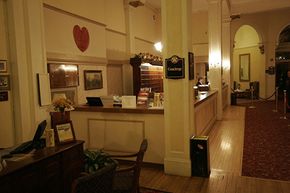
Jack Nargil, head concierge at the Hay-Adams Hotel in Washington, D.C., can get guests anything they want -- provided that it's "legal and ethical." He's routinely called upon to do everything from securing a dinner reservation at a booked restaurant to making sure a guest's shirts are cleaned and pressed in time for dinner. On occasion, he's even been asked to take care of more challenging requests -- for example, filling a rock star's suite with thousands of dollars' worth of white flowers.
Concierges like Nargil are "part Merlin, part Houdini," according to the hotel concierge association, Les Clefs D'Or. They can solve virtually any problem, and handle seemingly impossible tasks with surprising speed and alacrity.
Advertisement
Although the primary image of the concierge remains the hotel employee who makes dinner and show reservations and books sightseeing tours, the responsibilities that fall under the title have expanded significantly over the past three decades. Today, concierges offer a wide range of services in a variety of venues, from corporations to condominiums. And despite the common misconception that concierges work only for the very wealthy, in reality, their services are available to people of all incomes.
In this article, you'll find out what it takes to be a great concierge, learn the history of the profession, and read some of the bizarre requests that concierges have accommodated over the years.
The essence of the concierge job is to provide service. A hotel concierge is there to ensure that guests have everything they need during their stay. Typically, the concierge sits at a desk in the lobby, and guests can either stop by or call with their requests. Those requests may include:
- Getting restaurant reservations
- Booking theater or concert tickets
- Scheduling sightseeing tours and shopping excursions
- Giving directions to local attractions
- Hiring a car/limo for sightseeing or to get to the airport
- Making complete travel arrangements, from confirming flights and seat assignments to securing visas
- Replacing a toothbrush, toothpaste or other personal items that a traveler left at home
- Storing luggage until a guest checks in or out
- Helping to plan a corporate meeting, party or wedding at the hotel
- Arranging for an interpreter to assist a foreign guest
In the next section, we'll look at personal concierges.
Advertisement


